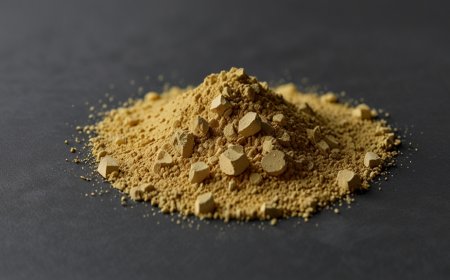Enhance Skin Tone with Skin Lightening Products
Discover how skin lightening products can enhance skin tone naturally. Learn about safe, effective solutions for a brighter and even complexion.
Achieving a clear, even complexion is a common skincare goal. Many people struggle with dark spots, hyperpigmentation, and uneven skin tone caused by sun exposure, hormonal changes, or aging. Skin lightening products can enhance skin tone by reducing pigmentation and promoting a brighter appearance. But with so many options available, it is important to understand how these products work, which ingredients are effective, and how to use them safely.
This post explores the science behind skin lightening, the best ingredients to look for, and how to incorporate these products into your skincare routine for the best results.
Understanding Skin Tone and Hyperpigmentation
Skin tone is determined by melanin, a pigment produced by melanocytes in the skin. When melanin production increases due to factors like sun damage, acne scars, or hormonal changes, it leads to hyperpigmentation. This condition appears as dark patches, spots, or an uneven complexion.
Skin lightening products work by reducing melanin production and promoting skin renewal. Some products contain natural extracts, while others use chemical agents to fade discoloration and improve skin clarity. Choosing the right formulation is key to achieving safe and effective results.
Key Ingredients That Help Enhance Skin Tone
The effectiveness of skin lightening products depends on the ingredients they contain. Here are some of the most researched and recommended components:
1. Vitamin C
Vitamin C is a powerful antioxidant that helps brighten skin, reduce dark spots, and protect against sun damage. It works by inhibiting melanin production and promoting collagen synthesis, resulting in a more even complexion.
2. Niacinamide (Vitamin B3)
Niacinamide is known for its ability to reduce inflammation, strengthen the skin barrier, and fade hyperpigmentation. It also improves skin elasticity, making it a popular choice in many skincare formulations.
3. Alpha Arbutin
Alpha arbutin is a gentle skin-lightening agent derived from the bearberry plant. It inhibits melanin production and reduces dark spots without causing irritation, making it suitable for sensitive skin.
4. Kojic Acid
Kojic acid is derived from fungi and is commonly used to treat hyperpigmentation. It works by blocking the enzyme tyrosinase, which is responsible for melanin production. Regular use helps improve skin clarity and brightness.
5. Licorice Extract
Licorice extract contains glabridin, which helps fade dark spots and prevents further pigmentation. It also has anti-inflammatory properties that soothe irritated skin.
6. Retinol
Retinol is a form of vitamin A that promotes cell turnover, helping to fade pigmentation and improve skin texture. It also boosts collagen production, reducing the appearance of fine lines and wrinkles.
Are Skin Lightening Products Safe?
The safety of skin lightening products depends on the ingredients used. Some chemical-based products contain hydroquinone or steroids, which may cause skin thinning or irritation if used improperly. It is always best to choose dermatologist-approved formulations with scientifically backed ingredients.
Natural alternatives like vitamin C, niacinamide, and licorice extract provide effective results without the risk of harmful side effects. Reading product labels, doing patch tests, and consulting a skincare professional can help ensure safety.
How to Use Skin Lightening Products Effectively
To achieve the best results, it is essential to use skin lightening products correctly. Here are some key steps to follow:
-
Use Sunscreen Daily: UV exposure can trigger pigmentation and counteract the effects of lightening products. A broad-spectrum sunscreen with SPF 30 or higher should be used every day.
-
Be Consistent: Skin lightening treatments take time to show visible results. Regular application for at least six to eight weeks is necessary to see improvements.
-
Follow a Skincare Routine: Cleansing, exfoliating, and moisturizing help enhance the absorption and effectiveness of skin lightening ingredients.
-
Avoid Harsh Chemicals: Products containing high concentrations of hydroquinone or mercury can damage the skin. Opt for gentler, well-researched ingredients.
-
Do a Patch Test: Before using a new product, apply a small amount on a less visible area to check for any allergic reactions.
Common Myths and Facts About Skin Lightening
There are several misconceptions surrounding skin lightening products. Here are some common myths and the truth behind them:
Myth 1: Skin Lightening Products Bleach the Skin
Fact: Skin lightening products do not bleach the skin. They work by reducing excess melanin, helping to restore the skins natural tone.
Myth 2: Natural Remedies Work Faster Than Skincare Products
Fact: While natural remedies can support skin health, scientifically tested formulations deliver faster and more consistent results.
Myth 3: You Do Not Need Sunscreen When Using Skin Lightening Products
Fact: Sunscreen is essential when using skin lightening treatments. Without sun protection, pigmentation can return, reducing the effectiveness of the product.
Best Practices for Choosing the Right Skin Lightening Products
With a wide range of products available, choosing the right one can be overwhelming. Here are some guidelines to help:
-
Check the Ingredient List: Look for active ingredients like vitamin C, niacinamide, and kojic acid. Avoid products containing harmful chemicals like mercury or excessive hydroquinone.
-
Consider Your Skin Type: Some ingredients, like retinol, may cause dryness in sensitive skin. Choose formulations that suit your skins needs.
-
Read Reviews and Clinical Studies: Reliable brands provide evidence-backed formulations. Checking user reviews and clinical data helps ensure product effectiveness.
-
Consult a Dermatologist: If you have persistent pigmentation or sensitive skin, seek professional advice before starting a new treatment.
Natural Ways to Enhance Skin Tone Alongside Skin Lightening Products
In addition to using skin lightening products, certain lifestyle habits can help improve skin tone:
-
Stay Hydrated: Drinking enough water keeps skin hydrated and supports natural cell renewal.
-
Eat a Balanced Diet: Foods rich in antioxidants, vitamins, and omega-3 fatty acids promote healthy skin.
-
Get Enough Sleep: Proper rest allows the skin to repair and regenerate, improving its overall appearance.
-
Exercise Regularly: Physical activity boosts circulation, delivering oxygen and nutrients to the skin.
Conclusion
Choosing the right skin lightening products can enhance skin tone safely and effectively. By selecting well-researched ingredients, following a consistent skincare routine, and protecting the skin from UV damage, it is possible to achieve a brighter and more even complexion. Making informed choices and practicing good skincare habits can lead to long-lasting results while maintaining skin health.
FAQs
1. What causes uneven skin tone?
Uneven skin tone is caused by excess melanin production due to sun exposure, hormonal changes, aging, or acne scars.
2. Are brightening creams safe for daily use?
Yes, if they contain dermatologist-approved ingredients like vitamin C, niacinamide, or licorice extract and are free from harsh chemicals.
3. How long does it take to see results?
Most brightening products take 6 to 8 weeks of consistent use to show visible improvements in skin tone.
4. Can I use these products on sensitive skin?
Yes, but choose mild formulations with soothing ingredients and always perform a patch test before full application.
5. Do I need sunscreen when using these products?
Absolutely. Sunscreen prevents further pigmentation and protects the skin from UV damage, ensuring better results.
6. Which ingredients should I avoid in brightening creams?
Avoid harmful chemicals like mercury, steroids, and excessive hydroquinone, as they can cause skin damage over time.
7. Can I combine different brightening products?
Yes, but avoid overusing strong actives like retinol and vitamin C together to prevent irritation.
8. Do home remedies work for skin clarity?
Some natural ingredients like aloe vera and turmeric may help, but clinically tested products deliver faster and more consistent results.
9. Are brightening treatments suitable for all skin types?
Yes, but oily, dry, and sensitive skin types may need different formulations to achieve the best results.
10. What should I do if a product causes irritation?
Stop using the product immediately, rinse your skin with cool water, and apply a gentle moisturizer to soothe irritation.



















































